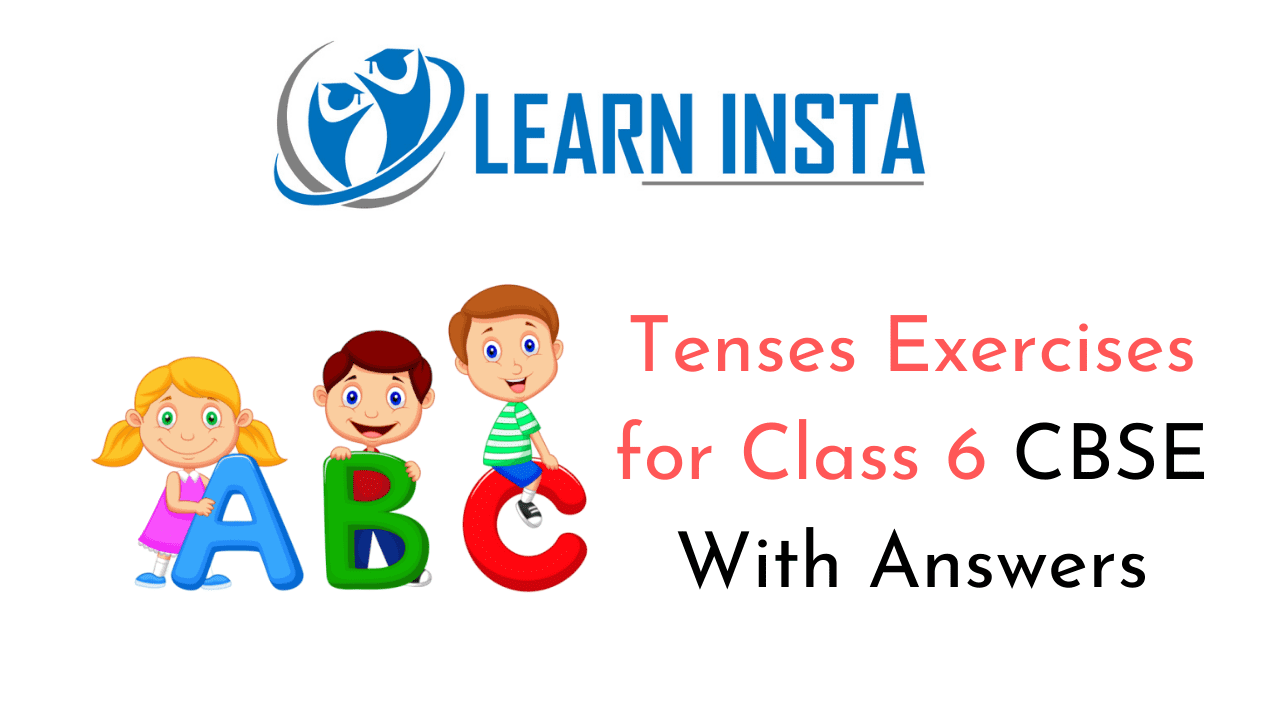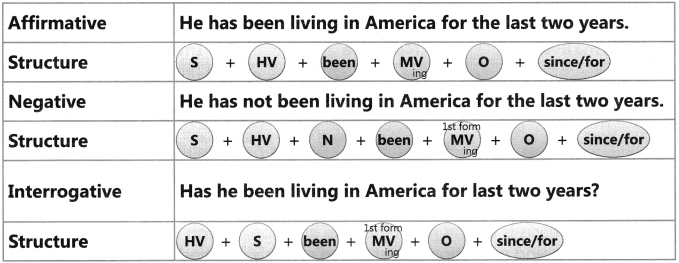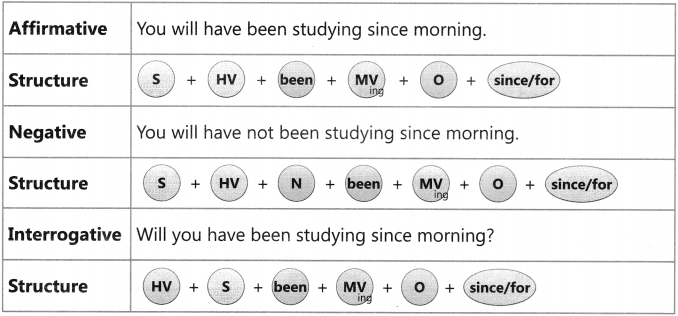 The Tense of a verb tells us when the action is, was, or will be carried out.
The Tense of a verb tells us when the action is, was, or will be carried out.
This grammar section explains English Grammar in a clear and simple way. There are example sentences to show how the language is used. You can also visit the most accurate and elaborate NCERT Solutions for Class 6 English. Every question of the textbook has been answered here.
Tenses Exercises or Class 6 CBSE With Answers Pdf
Fundamentals:
A tense is a form of verb which tells about the time when an action happens.
- The Present Tense
- The Past Tense
- The Future Tense
The Present Tense
Present Indefinite
Uses: action in the present taking place once, never or several times, facts, actions taking place one after another, action set by a timetable or schedule.
Form: I, you, we, they – play | he, she, it – plays
Structure: Subject + Verb 1st Form + Object
(s) (v) (o)
Usage in different types of sentences

S – Subject, 0–Object, N – Not, HV – Helping Verb, MV – Main Verb
Present Progressive (Continuous)
Uses: action taking place at the moment of speaking, action arranged for the future
Form: To be (in the simple present) + verb + ing
Structure: Subject + helping verb is/am/are + Verb 1st Form + ing + Object
(S) (V) (o)
Usage in different types of sentences

Uses: emphasis is on the result (not the duration), action that started in the past and is still going on, action that stopped recently, finished action that has an influence on the present.
Form: Have/has + past participle (past participle of regular verbs: verb + ed
Structure: Subject + helping verb (has/have)+Verb 3rd Form + Object
(s) (V) (O)
Usage in different types of sentences

Present Perfect Progressive (Continuous)
Uses: This is used for putting emphasis on the course or duration (not the result), an action that recently stopped or is still going on, finished action that influenced the present
Form: have or has + been + verb + ing

Usage in different types of sentences

For:
Used with the present perfect, for indicates the duration that is how long something has lasted or has continued:
Examples
- I have been in this town for a long time.
- He has known her for six years.
Since
Use since to say that something has been true from a particular time in the past until now.
Examples
- I have been in this town since I was 10 years old.
- He has known her since 2008.
Past Indefinite:
Uses: This tense is used for action in the past taking place once, never or several times, actions taking place one after another.
Form: Main verb + ed i.e, Play – Played (Past tense)
Structure: Subject + Verb llnd Form + Object
(s) (v) (o)
Usage in different types of sentences

Past Progressive (Continuous)
Uses:- We use this tense for action going on at a certain time in the past, actions taking place at the same time, action in the past that is interrupted by another action
Form:- To be (in the simple past) + verb + ing
Structure:- Subject + helping verb (was/were) +Verb 1st Form + ¡ng +Object
(s) (v) (o)
Usage in different types of sentences

Past Perfect
Uses: This tense is used for action taking place before a certain time in the past, sometimes interchangeable with past perfect progressive, putting emphasis only on the fact (not the duration).
Form: had + past participle (past participle of regular verbs: verb + ed
Structure: Subject + helping verb (had)+Verb 3rd Form + Object
(s) (v) (o)
Usage in different types of sentences

Past Perfect Progressive (Continuous)
Uses: This tense is used for action taking place before a certain time in the past, sometimes interchangeable with past perfect simple putting emphasis on the duration or course of an action.
Form: had + been + verb + ing
Structure: Subject + helping verb (had) + been + Verb Ist Form + ing + object + Since/For
Usage in different types of sentences


We use since for definite time.
We use for an indefinite time.
Future Indefinite
Uses: We use the simple future for instant decisions, when we predict a future situation. We use the simple future in conditional sentences type one.
Form: will + Ist form of verb
Structure: Subject + will/shall + Verb Ist Form + Object
(S) (V) (o)
Usage in different types of sentences

Uses: It is used for actions that will be going on at a certain time in the future, actions that are sure to happen in the near future.
Form: will + be + verb + ing
Structure: Subject + helping verb will/shall +be +Verb 1st Form + ing + Object
(S) (V) (o)
Usage in different types of sentences

Future Perfect
Uses: We use this tense for action that will be finished at a certain time in the future
Form: will + have + past participle
Structure: Subject + helping verb (will have/shall have)+ 3rd Form verb + Object
(s) (v) (o)
Usage in different types of sentences

Future Perfect Progressive (Continuous)
Uses: We use this tense for action taking place before a certain time in the future, putting emphasis on the course of an action
Form: will + have + been + verb + ing
Structure: Subject + helping verb (will have/shall have) + been + Verb 1st Form + ing + Object + Since/For
Usage in different types of sentences

We use Since for definite time.
We use For for indefinite time.
Tenses Exercises Solved Examples for Class 6 CBSE
Question 1.
Fill in the blanks
(i) We __________ TV when it started to rain. (to watch)
(ii) I __________ to visit yesterday, but you __________ not at home. (to want) (to be)
(iii) Look ! It __________, so we can’t __________ to the beach. (to rain) (to go)
(iv) There are a lot of clouds! It __________ soon. (to rain)
(v) The sun __________ in the east. (to rise)
(vi) Since 2011 they __________ their son every year. (to visit)
(vii) While the doctor __________ Mr Jones this morning, his soon outside. (to examine) (to wait)
(viii) I __________ for my girlfriend for two hours. (to wait)
(ix) After Larry __________ the film on TV, he decided to buy the book. (to see)
(x) Wait a minute, __________ this box for you. (to carry)
Answer:
(i) were watching
(ii) wanted, were
(iii) is raining, go
(iv) is going to rain
(v) rises
(vi) have visited
(vii) was examining, was waiting
(viii) have been waiting
(ix) had seen
(x) will carry
Question 2.
Put the verbs into the correct tense (simple present or present progressive)
(i) Look! Sara (go) __________ to the movies.
(ii) On her right hand, Sara (carry) __________ her handbag.
(iii) The handbag (be) __________ very beautiful.
(iv) Sara usually (put) __________ on black shoes but now she (wear) __________ white trainers.
(v) And look, she (take) __________ an umbrella because it (rain) __________.
Answer:
(i) going
(ii) carrying
(iii) is
(iv) puts, wearing
(v) taking, raining
Tenses Exercises Practice Examples for Class 6 CBSE
Question 1.
Fill in the blanks with the simple future form of the verbs given in the box.
1. In two days, I __________ (know) my results.
2. ‘There is the doorbell.”I __________ (go)’
3. You __________ (regret) this decision.
4. We __________ (never know) what happened to her.
5. The whole nation __________ (be) proud of you.
6. That __________ (be) our gift to the school.
7. Kind words __________ (give) others joy.
8. This piece of wisdom __________ (cost) you ten dollars.
9. You __________ (never understand) my position.
10. Someday I __________ (write) a novel.
Question 2.
Put the verbs into the correct tense (simple past or past perfect)
(i) When he (wake up). __________, his mother (already / prepare) breakfast.
(ii) We (go) __________ to London because our friends (invite) __________.
(iii) He (hear) __________ the news, (go) to the telephone and (call) __________ a friend.
(iv) When she (start) __________ learning English she (already / learn) French.
(v) Jane (already / type). __________ three pages when her computer (crash).
(vi) By the time the doctor (arrive) __________ at the house the patient (die) __________.
(vii) Before that day we (never / think) __________ of traveling to Japan.
(viii) I (know) __________ him a long time before I (meet). __________ his family.
(ix) They (not/know) __________ where to meet because nobody (tell) __________ them.
(x) It (be). __________ cloudy for days before it (begin) __________ to rain.
CBSE Class 6 English Grammar
- Tenses Exercise Class 6
- Active And Passive Voice Exercises Class 6
- Reported Speech Exercises Class 6
- Sentences Exercises Class 6
- Modals Exercises Class 6
- Omission Exercises for Class 6
- Editing Exercises for Class 6
- Jumbled Sentences for Class 6
- Noun Exercises Class 6
- Pronoun Exercise Class 6
- Adjectives Exercises Class 6
- Subject Verb Agreement Exercises Class 6
- Adverb Exercises Class 6
- Preposition Exercise Class 6
- Conjunction Exercise Class 6
- Interjections Exercises Class 6